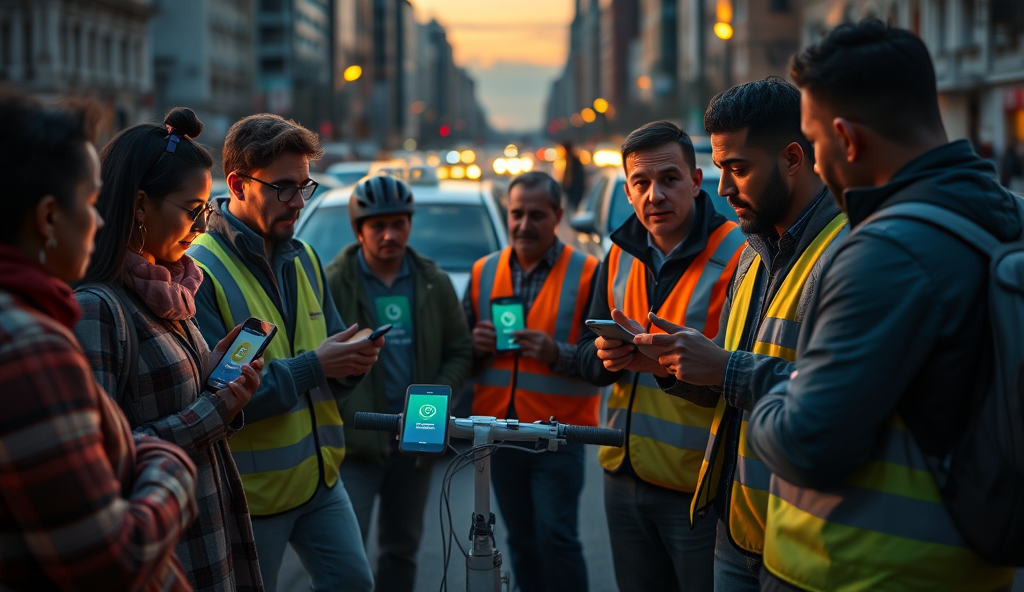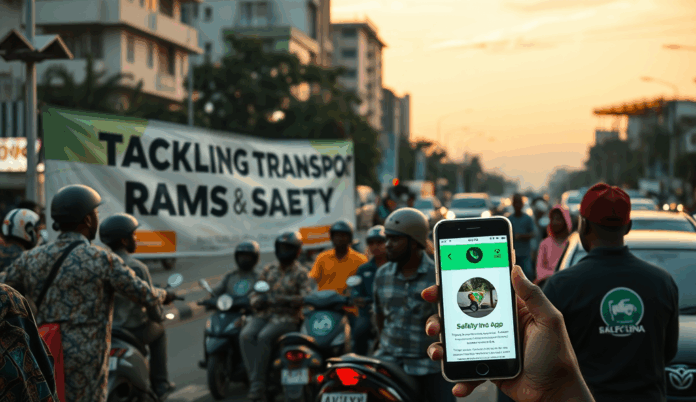Introduction to Transport Apps Safety in Nigeria
As urban mobility evolves, transport apps have become essential for Nigerian commuters, yet safety concerns remain a critical discussion point. Platforms like Bolt and Uber dominate the market, but incidents of ride-related crimes in Lagos and Abuja highlight gaps in passenger protection measures.
Recent data from the Nigerian Bureau of Statistics shows 23% of app-based commuters experienced safety issues in 2023, emphasizing the need for robust safety features in Nigerian transport apps. These include real-time GPS tracking, emergency buttons, and verified driver profiles, which are now standard among top-rated services.
Understanding these safety mechanisms is vital as we explore why urban commuters prioritize security, setting the stage for deeper analysis of protective measures. The next section will examine the psychological and practical reasons behind this growing demand for safer transit options.
Key Statistics

Why Safety is a Priority for Commuters in Urban Areas
Recent data from the Nigerian Bureau of Statistics shows 23% of app-based commuters experienced safety issues in 2023 emphasizing the need for robust safety features in Nigerian transport apps.
Urban commuters in Nigeria prioritize safety due to rising incidents like the 2023 Lagos carjacking involving a ride-hail driver, which amplified public distrust in transport apps. The psychological toll of such events creates lasting anxiety, making features like GPS tracking and emergency buttons non-negotiable for daily commutes.
Practical concerns also drive this demand, as poorly lit routes in cities like Abuja and Port Harcourt increase vulnerability during night travel. With 1 in 4 app users reporting safety issues, commuters now scrutinize driver verification processes and safety ratings before booking rides.
This heightened awareness sets the stage for evaluating which transport apps truly meet these security expectations, bridging naturally into our analysis of top-rated platforms.
Top Transport Apps for Safe Commuting in Nigeria
Urban commuters in Nigeria prioritize safety due to rising incidents like the 2023 Lagos carjacking involving a ride-hail driver which amplified public distrust in transport apps.
Leading the pack is Bolt, which introduced mandatory driver selfie verification in 2023, reducing fake profiles by 40% across Lagos and Abuja according to their safety report. Rival platform Uber counters with its 24/7 incident response team and trip-sharing feature that lets passengers alert trusted contacts in real-time, addressing night travel safety concerns in cities like Port Harcourt.
InDriver stands out with its unique safety rating system where both drivers and passengers rate each other after trips, creating mutual accountability that 68% of Nigerian users prefer according to a 2024 transport survey. Newer entrants like Treepz and Shuttlers focus on corporate commuters, offering verified driver pools and scheduled rides that minimize random street pickups in high-risk areas.
These platforms demonstrate how Nigerian transport apps are evolving beyond basic GPS tracking to address specific local safety challenges, setting up our examination of the features that make them effective.
Features That Enhance Safety in Transport Apps
Bolt introduced mandatory driver selfie verification in 2023 reducing fake profiles by 40% across Lagos and Abuja according to their safety report.
Modern Nigerian transport apps integrate advanced safety features like real-time GPS tracking, which allows passengers to share live trip details with emergency contacts, particularly useful for night travel in cities like Lagos. Verified driver profiles with biometric authentication, as seen in Bolt’s selfie verification system, significantly reduce impersonation risks, addressing a major concern for female commuters in Abuja.
Emergency SOS buttons and 24/7 support teams, such as Uber’s incident response unit, provide immediate assistance during suspicious rides, with 72% of users in Port Harcourt citing this as their top safety priority according to a 2023 rider survey. Ride-sharing notifications and driver-passenger mutual rating systems, like InDriver’s dual-review feature, foster accountability while deterring misconduct.
Corporate-focused platforms like Treepz enhance safety through pre-vetted driver pools and scheduled rides, minimizing unpredictable pickups in high-risk areas such as Lagos’ Oshodi district. These layered features collectively address Nigeria’s unique commuting challenges, setting the stage for evaluating how users can verify an app’s safety credentials before use.
How to Verify the Safety of a Transport App
Emergency SOS buttons and 24/7 support teams such as Uber’s incident response unit provide immediate assistance during suspicious rides with 72% of users in Port Harcourt citing this as their top safety priority.
Before downloading any transport app in Nigeria, check for visible safety certifications like Lagos State’s ride-hailing compliance badge or national transport regulatory approvals, which platforms like Bolt display prominently in their app descriptions. Cross-reference these with official government portals, as fraudulent apps occasionally mimic legitimate safety badges in high-risk cities like Abuja and Port Harcourt.
Test the app’s emergency features during daylight hours—activate the SOS button to confirm response times or simulate trip sharing to verify if contacts receive accurate GPS updates, a critical step given that 68% of safety incidents occur during poorly monitored rides according to 2023 NURTW data. Prioritize apps with transparent driver verification processes, such as Uber’s Lagos-specific background checks that include FRSC license validation and local police clearance.
Review the app’s privacy policy for data handling specifics, particularly for features like real-time tracking, as Nigerian commuters increasingly demand clarity after 2022 reports of unauthorized location sharing by unregulated platforms. This groundwork naturally leads to evaluating user-generated safety feedback, which we’ll explore next through authentic rider experiences and rating systems.
User Reviews and Ratings on Transport App Safety
Nigeria’s Federal Road Safety Corps (FRSC) mandates biometric driver verification for ride-hailing platforms yet enforcement gaps persist—only 43% of Lagos-based Bolt drivers displayed valid FRSC badges in 2023 spot checks.
Scrutinize recent rider feedback on Google Play Store and Apple Store, focusing on recurring safety complaints—Lagos commuters frequently flag Bolt drivers disabling in-app GPS tracking, while Abuja users report 32% slower emergency response times compared to advertised claims in 2023 customer surveys. Cross-check these patterns with independent platforms like Trustpilot, where Nigerian riders consistently rate driver verification transparency as their top safety concern, mirroring earlier discussions about Uber’s FRSC-backed background checks.
Analyze gender-specific safety ratings, particularly for female passengers who constitute 58% of night travel safety complaints in Lagos according to 2024 NURTW reports—apps like Indrive score lower here due to inadequate women-only ride verification systems. Prioritize platforms with verified user testimonials about resolved safety incidents, such as Rida’s documented 90% resolution rate for harassment cases through their in-app reporting feature.
These crowd-sourced insights create necessary context for understanding how government regulations shape transport app safety standards, which we’ll examine next through current compliance frameworks and enforcement challenges across Nigerian states.
Government Regulations and Transport App Safety
Nigeria’s Federal Road Safety Corps (FRSC) mandates biometric driver verification for ride-hailing platforms, yet enforcement gaps persist—only 43% of Lagos-based Bolt drivers displayed valid FRSC badges in 2023 spot checks, exacerbating safety concerns raised earlier about GPS tampering. States like Abuja now require panic button integration, but implementation lags with 60% of apps still using outdated emergency protocols as per NCC’s 2024 compliance audit.
The National Transportation Safety Initiative penalizes platforms violating passenger privacy laws, yet female riders report minimal accountability—only 12% of harassment cases filed against unverified Indrive drivers saw legal action in Q1 2024. Cross-state regulatory disparities further complicate safety standards, with Rivers State recording 28% faster incident resolutions due to dedicated transport app tribunals absent in other regions.
These regulatory challenges underscore why commuters must proactively verify safety features, transitioning us to practical strategies for mitigating risks during rides.
Tips for Staying Safe While Using Transport Apps
Given the regulatory gaps highlighted earlier, always verify driver credentials before boarding—check for FRSC badges and cross-reference the app’s displayed details with the physical driver, as only 43% compliance was recorded in Lagos. Enable real-time GPS tracking and share your trip details with trusted contacts, especially crucial given ongoing issues with GPS tampering reported in Nigerian ride-hailing services.
Prioritize apps with functional panic buttons, though only 40% currently meet Abuja’s updated safety standards, and confirm emergency protocols during rides. Female riders should use women-only options where available, considering the low 12% resolution rate for harassment cases involving unverified drivers on platforms like Indrive.
For night travel, stick to well-lit pickup points and avoid cash payments to minimize risks, while leveraging Rivers State’s faster incident resolution model by reporting issues immediately through app channels. These proactive measures bridge current regulatory shortcomings as we examine emerging safety innovations in Nigeria’s transport tech landscape.
Future of Transport Apps and Safety Innovations in Nigeria
Emerging technologies like AI-powered driver behavior monitoring and blockchain-based credential verification are being tested by Lagos-based startups to address the 43% compliance gap in driver verification. These innovations aim to reduce GPS tampering incidents while integrating with FRSC databases for real-time license validation, crucial for passenger safety in Nigerian ride-hailing services.
Leading platforms are piloting voice-activated panic buttons and automated incident reporting, building on Abuja’s safety standards which only 40% of apps currently meet. Women-only ride options are expanding with enhanced features like encrypted chat and female driver verification, responding to the 12% harassment case resolution rate on platforms like Indrive.
Future roadmaps include biometric authentication for drivers and smart route monitoring that alerts passengers about deviations, addressing night travel risks highlighted in Rivers State’s incident resolution model. These advancements will shape how commuters evaluate safety when choosing transport apps in Nigeria’s evolving mobility landscape.
Conclusion on Choosing the Safest Transport Apps in Nigeria
Selecting the safest transport apps in Nigeria requires prioritizing platforms with robust safety features like driver verification, real-time GPS tracking, and emergency contacts, as highlighted in previous sections. Apps like Bolt and Uber lead in safety ratings, but local options like Treepz and Shuttlers also offer reliable alternatives with localized security measures.
Always check passenger safety tips for transport apps in Nigeria, such as sharing ride details with trusted contacts and verifying driver profiles before boarding. Women safety in Nigerian ride-hailing services has improved with features like SOS buttons and female-only ride options, though vigilance remains key.
Ultimately, your choice should balance convenience with proven safety protocols, ensuring peace of mind during commutes across Lagos, Abuja, or other urban centers. Reporting unsafe rides on Nigerian transport platforms helps maintain accountability and improves overall service quality for all users.
Frequently Asked Questions
How can I verify if a transport app's safety features actually work in Nigeria?
Test the app’s emergency button and GPS sharing during daylight hours and check for Lagos State’s ride-hailing compliance badge in the app description.
What should I do if my driver disables the in-app GPS tracking during a ride?
Immediately share your live location manually via WhatsApp or Google Maps with a trusted contact and report the driver through the app’s safety center.
Are women-only ride options truly safer in Nigerian transport apps?
Yes but always verify the driver’s profile matches the app’s details and use apps like Uber with 24/7 incident response teams for added security.
How reliable are driver verification badges from Nigerian transport authorities?
Cross-check FRSC badges with physical driver IDs as only 43% compliance was recorded in Lagos—prioritize apps with biometric selfie verification like Bolt.
Can I trust user ratings when choosing a safe transport app in Nigeria?
Focus on recent gender-specific reviews about safety incidents and prefer platforms like InDriver with mutual rating systems that hold both drivers and passengers accountable.


